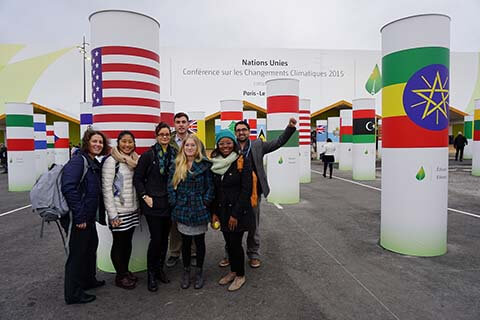Purdue professors at Paris Climate Summit to study climate change and indigenous people
December 3, 2015
 |
|
(From left) Kimberly R. Marion Suiseeya, an assistant professor of political science; Sarah Huang, a graduate student in cultural anthropology; Laura Zanotti, an associate professor of anthropology; Scott Benzing, an undergraduate student in natural resources planning and decision making; Elizabeth Wulbrecht, a graduate student in political science; Suraya Williams, an undergraduate student in ecology, evolution, and environmental biology; and Fernando Tormos, a doctoral degree candidate in political science, at the Paris Climate Summit, COP21. (Photo provided) |
WEST LAFAYETTE, Ind. — Purdue University social scientists are attending the Paris Climate Summit, COP21, to understand how underrepresented and marginalized groups are represented and what role they play in international environmental negotiations.
The summit, which began Monday (Nov. 30) runs through Dec. 11. More than 40,000 people and 147 heads of state are expected to attend. Kimberly R. Marion Suiseeya, an assistant professor of political science, and Laura Zanotti, an associate professor of anthropology, lead the Purdue team. This is part of their Presence2Influence project, which focuses on the ways marginalized and underrepresented groups influence environmental policy that affects their way of living. The team's interest is indigenous rights related to forests and biodiversity.
"The United Nations has identified indigenous peoples and women as two groups most affected by environmental change, including climate change," said Marion Suiseeya, who focuses on environmental justice and community resilience. "Although indigenous peoples make up approximately 5 percent of the global population, they constitute more than one-third of the world's poorest people and govern, occupy or use nearly 22 percent of global land area, thus suggesting that indigenous peoples, and indigenous women in particular, are key stakeholders in global environmental governance."
Presence2Influence is a long-term research project that also will include the September 2016 World Conservation Congress. The team can be followed on Twitter at @COP21Research, and they also will be blogging from COP21.
"We are using collaborative event ethnography – a team-based approach to study mega events," said Zanotti, an environmental anthropologist. "We will be able to sit on official COP21 negotiations, as well as cover civil society events. We are especially interested in aspects related to tension, negotiation and debate as a part of how underrepresented and marginalized groups pursue justice and influence international environmental negotiations."
This project is supported by the Department of Political Science, the Purdue Climate Change Research Center in Discovery Park, the Center for the Environment, the College of Liberal Arts, and the Department of Anthropology.
The Presence2Influence team also includes Sarah Huang, a graduate student in cultural anthropology; Fernando Tormos, a doctoral degree candidate in political science; Scott Benzing, an undergraduate student in natural resources planning and decision making; Suraya Williams, an undergraduate student in ecology, evolution, and environmental biology; and Elizabeth Wulbrecht, a graduate student in political science. The team also is working with 33 undergraduate students in Marion Suiseeya's “International Environmental Policy” course to capture digital ethnography aspects including social media activity.
Writer: Amy Patterson Neubert, 765-494-9723, apatterson@purdue.edu
Sources: Kimberly R. Marion Suiseeya, kmarions@purdue.edu
Laura Zanotti, lzanotti13@gmail.com

